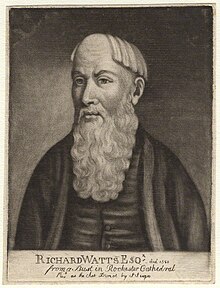

|
|
|
||
| Line 67: | Line 67: | ||
|first= |
|first= |
||
}} |
}} |
||
</ref> Satis House is now the administrative building for [[The King's School, Rochester]]. A bust of Watts has been set on top of the building's portico. Dickens used the name Satis House for Miss Havisham's house in his novel, [[Great Expectations]], although other aspects of the fictitious Satis House were modelled on nearby Restoration House. |
</ref> Satis House is now the administrative building for [[The King's School, Rochester]]. A bust of Watts has been set on top of the building's portico. Dickens used the name Satis House for Miss Havisham's house in his novel, [[Great Expectations]], although other aspects of the fictitious Satis House were modelled on nearby [[Restoration House]]. |
||
==References== |
==References== |
||

Sir Richard Watts (1529-1579) was a successful businessman and MP for Rochester, Kent in the 1570s. Famed locally for his philanthropy, he left money in his will to establish the Richard Watts Charity and Six Poor Travellers House in Rochester High Street.[1]
Watts left money in his will for the benefit of six poor travellers, each of whom, according to a plaque on the outside of the building, would be given lodging and 'entertainment' for one night, before being sent on their way with fourpence.
RICHARD WATTS, Esq.
by his Will, dated 22 Aug. 1579,
founded this Charity
for Six poor Travellers,
who not being ROGUES, or PROCTORS,
May receive gratis for one Night,
Lodging, Entertainment,
and Fourpence each.
Inscription on charity entrance
The house was the inspiration for Charles Dickens' short story, The Seven Poor Travellers. Watts' benevolence and the Dickens story are remembered during Rochester's fancy dress Dickensian Christmas Festival, when a turkey is cooked and ceremoniously distributed to 'the poor' at the house.
Henry Lucy described a visit to the house in "Christmas Eve at Watts's" in Faces and Places and throws an interesting light on Dickens' story, through the words of the house-keeper.[2]
There is also a very detailed account of Richard Watts's Charity, Rochester in Chapter VI of A Week's Tramp in Dickens-Land, by William R. Hughes.[3]
Watts' legacy was so substantial that a charity bearing his name is still in existence today. The Watts Almshouses, administered by the charity, on Rochester's Maidstone Road, are a fine example of Victorian gothic cottagery.
Queen Elizabeth I was the guest of Sir Richard Watts in 1573. When he asked her if his house was to her liking, she replied 'Satis' (Latin for 'enough'). The house was thereafter known as 'Satis House'.[4] Satis House is now the administrative building for The King's School, Rochester. A bust of Watts has been set on top of the building's portico. Dickens used the name Satis House for Miss Havisham's house in his novel, Great Expectations, although other aspects of the fictitious Satis House were modelled on nearby Restoration House.